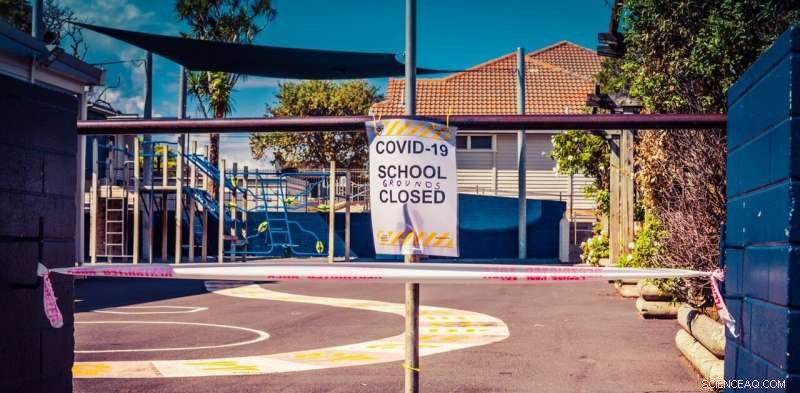
Crédito:Shutterstock
La noticia de que todos los miembros del personal de una pequeña escuela de King Country todavía no estaban vacunados una semana antes de la fecha límite obligatoria del gobierno del 15 de noviembre subraya cuán desafiantes podrían ser las próximas semanas.
El próximo lunes marca el día en que los maestros deberán haber recibido al menos una dosis de la vacuna COVID-19 si quieren continuar trabajando con los estudiantes en un entorno de aprendizaje presencial.
También será el día en que los líderes educativos descubran con cierta certeza quiénes son sus colegas que dudan en vacunarse y cuándo las carreras profesionales de muchos educadores comprometidos llegarán a una encrucijada.
Dado que parece probable que algunas escuelas enfrenten una importante escasez de personal, la profesión docente ahora tiene que luchar seriamente para demostrar el valor de manaakitanga a todos los colegas, incluidos los no vacunados.
COVID-19:todo el personal de la pequeña escuela de King Country se niega a vacunarse antes de la fecha límite de la próxima semana https://t.co/fDKGzVpbj9
— Noticias RNZ (@rnz_news) 8 de noviembre de 2021
El código de responsabilidad
Como profesor totalmente registrado (así como académico), seré libre de enseñar en las escuelas de Nueva Zelanda, si los niveles de alerta lo permiten, porque estoy doblemente vacunado. Pero sé que ese no es el caso de algunos de mis muy talentosos y comprometidos colegas que han rechazado el golpe de Pfizer.
Solo puedo imaginar las crisis de identidad profesional que estos colegas deben estar experimentando.
Estoy pensando en aquellos maestros que creen sinceramente que están honrando su compromiso con la sociedad, adoptado en el Código de Responsabilidad Profesional del Consejo de Enseñanza de Aotearoa Nueva Zelanda (TCANZ), al defender los derechos humanos de los neozelandeses a la autonomía corporal.
Estoy pensando en esos maestros que creen apasionadamente que están honrando su compromiso con la sociedad al mostrar la integridad ética para enfrentarse a un poder que creen que está engañando al público.
Estoy pensando en esos maestros que creen que están "haciendo lo que predican" de un profesional críticamente reflexivo al negarse a ser vacunados.
Y estoy pensando en mi propio compromiso con esos maestros como mis colegas profesionales, a pesar de mi desacuerdo fundamental con sus creencias contra la vacunación.
La docencia como actividad ética
El documento guía de TCANZ para maestros—Nuestro Código, Nuestros Estándares—describe los compromisos éticos de todos los maestros. The council recognizes that for the code to be "owned," the professional commitments should not be seen as a list of prescribed rules.
Rather, it is a set of agreed aspirations that encourage collaborative conversations between practitioners about the ethical nature of their work.
There is no doubt the vaccine mandate will demand some of the most ethically challenging conversations teachers from both vaccination camps will have in their professional careers.
However, that's no reason to shy away from collegial awkwardness. One of New Zealand's pre-eminent educational thinkers, the late Ivan Snook, believed teaching is an innately ethical activity as it involves close personal relationships, not least between colleagues.
Snook also provides us with some wise guidance on how we might go about these challenging discussions. He addresses the fundamental tension teachers face when trying to persuade others to take a on a point of view they believe is demonstrably rational.
Snook frames this tension as the "conflicting obligations to respect the learner's state of mind and also move her towards a more adequate understanding and a more enlightened practice."
An ethic of care
As colleagues in discussion with those who disagree with us on the vaccine mandate, we must be ready to respect the ethical integrity of alternative viewpoints, while providing rational alternatives based on reputable scientific evidence.
Nor should we decry those who distrust authority. As Snook argues, a major task of educators is to help others come to understand the importance, and limitations, of all authorities.
It is my hope that over the next few months we will see the code truly become "our code" as it guides vaccinated and unvaccinated teachers to have these respectful conversations about what it is to be a critically reflective, ethical teacher in a society in the grip of a global pandemic.
But if the code is to guide teachers through these difficult conversations it needs to be used with care. If it's simply a weapon of entrenched positions there is nothing to be gained.
Educational philosopher Nel Noddings said conversations of this complexity need to happen within an "ethic of care" that is sensitive to the relationships in which we must all continue to live.
In the spirit of whanaungatanga, I encourage my vaccinated and unvaccinated colleagues to be courageous and use the code to discuss the vaccine mandate within such an ethic of care.
Let us decide together what that is, and what it means to be an ethical teacher in Aotearoa New Zealand in this watershed moment for our profession.